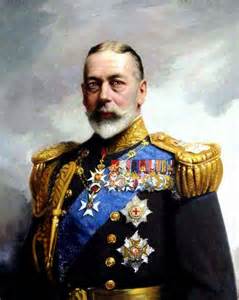"It's Good to Be the King"--Unless You Are a German King in Great Britain
 Thursday, February 12, 2015 at 03:37PM
Thursday, February 12, 2015 at 03:37PM  Americans love the Royal Family and are quite fascinated by them.
Americans love the Royal Family and are quite fascinated by them.
In 1981, countless Americans stayed up very late to watch the fairy-tale wedding of lady Diana Spencer to Prince Charles, only to spend a very sleepless Saturday night years later watching the news coverage when Diana died in Paris in a horrific 1997 traffic accident. Americans express great admiration for Queen Elizabeth, and we comb the tabloids to keep up with the doings of Kate and Prince William.
This fascination is aided by the fact that Great Britain has been our greatest ally through two world wars, the Cold War, and in the seemingly endless war on terror.
A recent essay in the BBC New reminded me that although Americans greatly admire Great Britain and the House of Windsor, during the Great War, the English people had big problems trusting their own monarch. The UK was led by a man (King George V), whom many considered to be a German sympathizer, and who happened to be Kaiser Wilhelm II's first cousin.
King George V cut a striking figure. But he was a Hanoverian king, whose family name included the suffix "of Saxe-Coburg and Gotha." This might not be that big a deal, until your nation is engaged in a fight to the death with Germany. Throughout the war years, there was an increasing wave of suspicion that England's royals were not terribly loyal to England's cause. And so with the stroke of a pen, the "Hanovers" of Saxe-Coburg and Gotha, became the "Windsors," the Royal Family we now know and love.
According to a recent essay in the BBC News (Click Here), the growing pressure of anti-German sentiment in the UK in the years between 1914-1917, brought about a significant change in the Royal Family's identity.
So in 1917 the royal family saw their name change overnight, princes lost their titles and became lords, the Battenbergs opted for literal translation and became Mountbatten, and the quintessentially royal and English "Windsor" was introduced - the brainchild of the king's private secretary Lord Stamfordham.
"Prince Louis of Battenberg went to stay with his son at a naval base in Scotland and wrote in the visitors book 'arrived Prince Hyde, left Lord Jekyll'," says Mr Little.
The BBC News essay goes on to note, this name change had far-reaching consequences for many immigrants.
But the royals' decision to change name was a path also trodden by immigrants to the UK in the 19th and 20th Century, particularly Jewish.
For Jews and other immigrants arriving in the 19th Century to live in an East End populated by co-religionists a name change was unnecessary, but for those aiming for middle class respectability it could be a temptation.
It may be "good to be the king," just not a Hanovarian king from Saxe-Gotha, while ruling over a British empire, which happens to be at war with Germany. It is worth noting that while the Hapburgs and Hohenzollerns lost all titles and rule, the Windsors live on, beloved in the UK, as well as here in America.


Reader Comments (1)